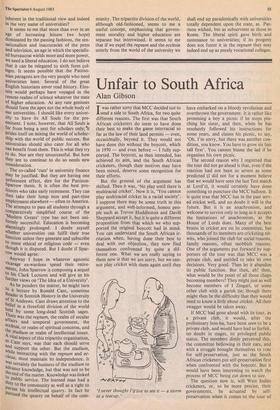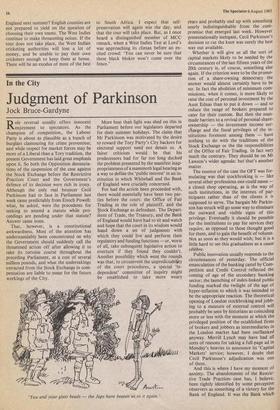Unfair to South Africa
Alan Gibson
Iwas rather sorry that MCC decided not to send a side to South Africa, for two quite different reasons. The first was that South African cricketers do seem to have done their best to make the game interracial so far as the law of their land permits — even, occasidnally, beyond it. They would not have done this without the boycott, which in 1970 — and even before — I fully sup- ported. The boycott, as then intended, has achieved its aim, and the South African cricketers, though their motives may have been mixed, deserve some recognition for their efforts.
But the ground of the argument has shifted. Then it was, 'No play until there is multiracial cricket'. Now it is, 'You cannot play multiracial cricket in a racial society'. I suppose there may be some truth in this argument, and well-informed, honest peo- ple such as Trevor Huddleston and Davitl Sheppard accept it, but it is quite a different proposition from that which we who sup- ported the original boycott had in mind. You can understand the South African ir- ritation when, having done their best to deal with our objection, they now find themselves confronted by quite a dif- ferent one. What wo are really saying to them now is that we are sorry, but we can- not play cricket with them again until they `I never thought I'd live to see it — a storm in a teacup.' have embarked on a bloody revolution and overthrown the government. It is rather like promising a boy a picnic if he stops pin- ching his sister, and then, when he has resolutely followed his instructions for some years, and claims his picnic, to say, `Oh, I'm sorry, but there was another con- dition, you know. You have to grow six feet tall first'. You cannot blame the lad if he organises his own picnic.
The second reason why I regretted that the tour did not go ahead is that, even if the reaction had not been so severe as some predicted (I did not for a moment believe that we would have seen the last Test match at Lord's), it would certainly have done something to puncture the MCC balloon. It is quite true that MCC has in the past serv- ed cricket well, and no doubt it will in the future. But it is an anachronism, and welcome to survive only so long as it accepts the limitations of anachronism, as the House of Lords does. Many of the best brains in cricket are on its committee, but thousands of its members are cricketing nit- wits, who joined the club for social reasons, family reasons, often snobbish reasons. One of the arguments put forward by sup- porters of the tour was that MCC was a private club, and entitled to take its own decisions. Very good. Then let it abandon its public function. But then, ah! then, what would be the point of all those chaps becoming members? They might just as well become members of I Zingari, or some other club with a garish tie; though there might then be the difficulty that they would need to know a little about cricket. All their swagger would be taken away.
If MCC had gone ahead with its tour, as a private club, it would, after the preliminary hoo-ha, have been seen to be a private club, and would have had to forfeit, no doubt in stages, its privileged public status. The members dimly perceived this, the committee bellowing in their ears, and with a struggle brought themselves to vote for self-preservation, just as the South African cricketers put self-preservation first when confronted with the boycott. But it would have been interesting to watch the process of MCC being cut down to size.
The question now is, will West Indies cricketers, or, to be more precise, their governments, be actuated by self- preservation when it comes to the tour of England next summer? English counties are not prepared to yield on the question of choosing their own teams. The West Indies continue to make threatening noises. If the tour does not take place, the West Indian cricketing authorities will lose a lot of money, and be unable to pay their own cricketers enough to keep them at home. There will be an exodus of most of the best to South Africa. I expect that self- preservation will again win the day, and that the tour will take place. But, as I once heard a distinguished member of MCC remark, when a West Indies Test at Lord's was approaching its climax before an ex- cited crowd: 'You can never be sure that these black blokes won't come over the fence.'







































 Previous page
Previous page